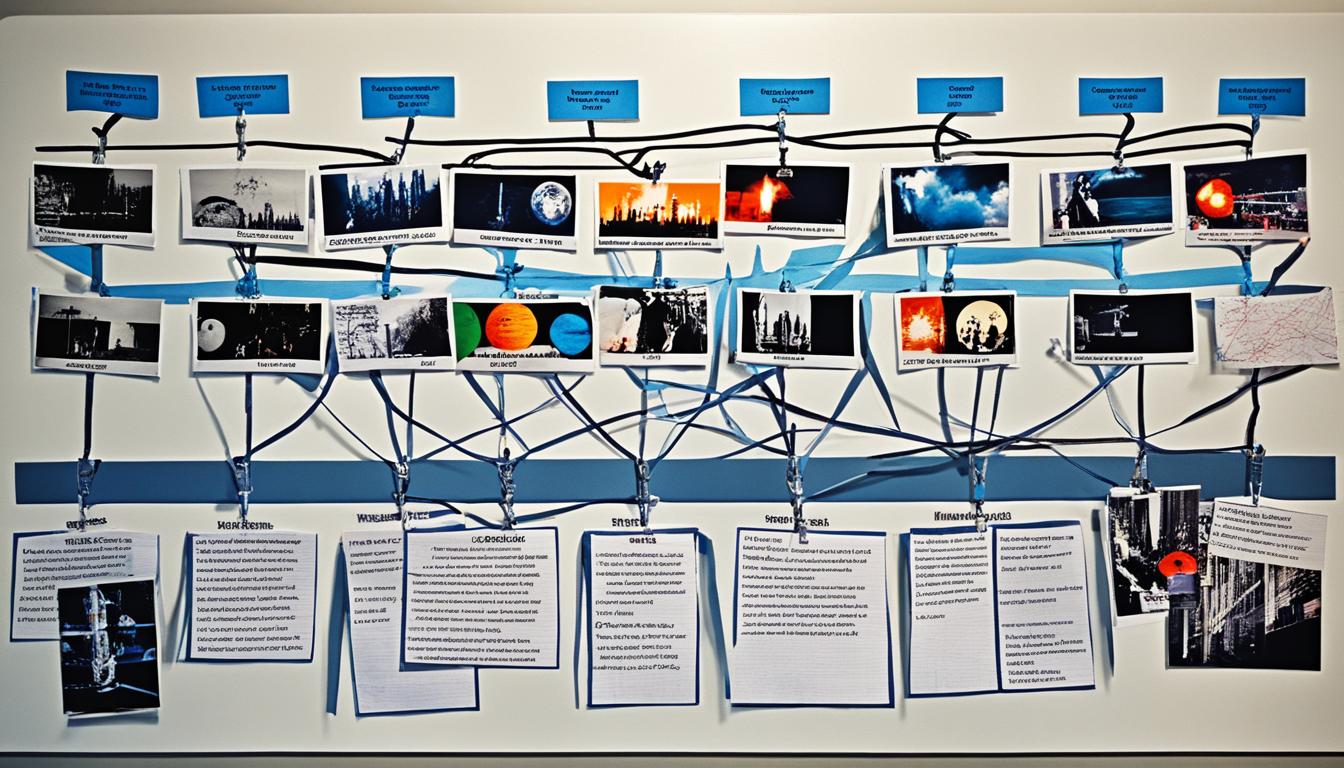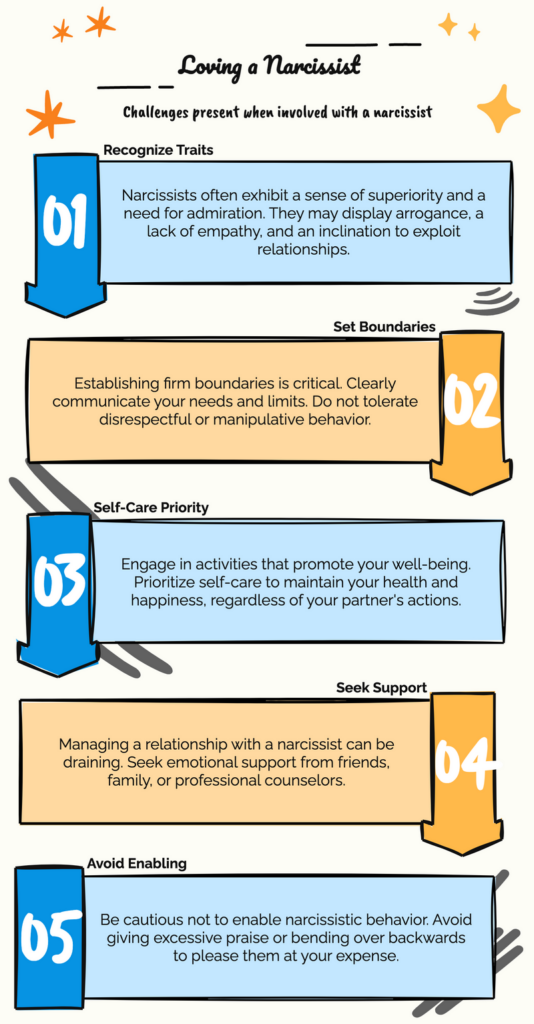How To Deal with Narcissism
Mastering the Narcissist Conversation Guide: Essential Tips for Effective Communication

Did you know that in the United States, 1 in every 16 people show signs of narcissistic personality traits?
Communicating with a narcissist can be extremely challenging and often leaves us feeling overwhelmed and unheard. Whether it’s a coworker, boss, friend, or even a family member, interacting with a narcissist requires a unique set of skills and strategies to navigate these difficult conversations.
In this comprehensive guide, we will explore effective techniques for communicating with narcissistic individuals across various settings. From understanding the signs of narcissism to setting boundaries, we will provide you with the tools you need to navigate these conversations with confidence and composure.
Key Takeaways:
- Recognize the signs of narcissism in conversations
- Practice active listening and paraphrasing techniques
- Set boundaries and assert your own needs
- Seek professional help if needed
- Prioritize your well-being and mental health
Tips for Communicating with Narcissists
When it comes to communication with narcissists, navigating the conversation can be challenging. However, by utilizing effective strategies and maintaining a strong sense of self, it is possible to engage in productive dialogues. Here are some helpful tips for communicating with narcissists:
- Assert your viewpoint: While acknowledging the narcissist’s perspective, it’s important to assert your own. Use phrases like “I see your point, but I have my perspective too” to convey your thoughts and opinions.
- Address unproductive conversations: If the conversation veers off track or becomes unproductive, it’s important to address it. Politely state, “This conversation is becoming unproductive,” and redirect the focus towards a more constructive topic.
- Take time to respond: Instead of reacting impulsively, take a moment to process what the narcissist has said. Respond with a thoughtful “I need to think about what you’ve said” to show that you are considering their words.
- Agree to disagree: When disagreements arise, it’s often best to agree to disagree rather than engaging in futile arguments. Suggest, “Let’s agree to disagree,” to maintain a respectful conversation.
- Set boundaries: Establishing boundaries is crucial in communicating with narcissists. Clearly state, “I’m setting boundaries for this discussion,” to ensure that your limits are respected.
- Propose a break: Emotions can run high in conversations with narcissists. If tensions escalate, propose taking a break and revisiting the discussion when both parties are calmer and more receptive to finding a resolution.
- Focus on finding solutions together: Encourage a collaborative approach by saying, “Can we focus on finding a solution together?” This helps shift the conversation towards problem-solving rather than dwelling on conflicts.
- Express value for the relationship: While addressing your concerns, emphasize that you value the relationship and want it to be positive. This demonstrates your commitment to maintaining a healthy connection.
- Show appreciation for input: Even if you may not fully agree, it’s important to show appreciation for the narcissist’s input. Affirm your intention to consider their perspective, fostering a more open and respectful dialogue.
By implementing these strategies, you can navigate conversations with narcissists more effectively, promoting healthier communication and maintaining your own well-being in the process.
Understanding Narcissism and Communication
Narcissistic personality disorder (NPD) is a mental condition characterized by an inflated sense of importance, a deep need for excessive attention and admiration, troubled relationships, and a lack of empathy for others. Individuals with NPD often exhibit narcissistic behavior and traits that significantly impact their ability to engage in healthy communication.
When conversing with a narcissist, it’s important to recognize their tendencies. Narcissists tend to make conversations about themselves, often interrupting others and redirecting the topic to their own experiences. They may appear emotionally distant, scroll their phone, and exhibit self-absorbed behavior. Communicating with a narcissist can be challenging, but understanding their behavior can help you navigate these interactions.

Common Narcissistic Traits
Here are some common traits that individuals with narcissistic personality disorder may exhibit:
- An exaggerated sense of self-importance
- A constant need for admiration and attention
- A lack of empathy for others
- An obsession with their own achievements and appearance
- Difficulty recognizing the emotions and needs of others
Challenges in Communication
Communication with narcissists can be challenging due to their self-centered nature. They often monopolize conversations, making it difficult for others to express themselves fully. Conversations may revolve around their achievements, experiences, and interests, leaving little room for others to contribute.
Narcissists may interrupt others, redirect the conversation to themselves, or display a lack of interest in others’ opinions. Their self-absorption may cause them to appear emotionally distant and less engaged in the conversation.
Effectively Communicating with a Narcissist
While communication with a narcissist can be difficult, there are strategies that can help:
- Set boundaries: Establish clear boundaries and assertively communicate them.
- Stay calm and assertive: Maintain a calm demeanor, avoiding reactive responses.
- Active listening: Validate their feelings, but don’t diminish or enable their narcissistic behavior.
- Redirect conversations: Gently guide the conversation back to a topic of mutual interest.
- Focus on solutions: Steer the conversation towards finding solutions rather than dwelling on the narcissist’s self-centeredness.
Remember, effective communication with a narcissist requires setting boundaries, staying calm, and redirecting conversations towards more balanced interactions.
Communicating with a Narcissistic Employee or Boss
When dealing with a narcissistic employee or boss, it’s crucial to navigate the workplace dynamics while maintaining professionalism. Here are some communication strategies to help you effectively interact with narcissists and manage workplace challenges:
- Carry out instructions: If your career depends on meeting the needs of a narcissistic boss, it is important to dutifully and effectively carry out their instructions.
- Showcase your own ideas: To excel and make your own mark, look for opportunities to present and implement your own ideas. It will help you expand your network and establish your credibility within the workplace.
- Beware of possible sabotage: Narcissists may try to sabotage your goals or projects to maintain their position of power. Stay vigilant and be prepared to handle any tactics they might employ.
- Seek promotions and new opportunities: To enhance your own value within the company, actively seek promotions and new opportunities that align with your goals and aspirations.
- Exit gracefully: If you decide to move on from a narcissistic boss, do it in a way that allows them to save face while asserting your own independence. Exit interviews or discussions with HR can help facilitate a smooth transition.
Remember, communication with narcissists in the workplace can be challenging, but by employing these strategies, you can navigate the dynamics and maintain your professional growth.
Dealing with Narcissists in the Workplace: A Table of Comparison
| Challenges | Strategies |
|---|---|
| Managing their ego | Recognize and acknowledge their accomplishments when appropriate, while staying true to your own ideas and contributions. |
| One-upping conversations | Redirect the conversation to a topic of mutual interest or politely disengage from one-upping exchanges. |
| Taking credit for your work | Document your contributions, communicate your accomplishments to higher authorities, and ensure your efforts are recognized. |
| Manipulative behavior | Stay vigilant and set clear boundaries to protect yourself from manipulation. Maintain professional composure and seek support if needed. |
| Impacts on team dynamics | Focus on cultivating positive relationships with colleagues and seek opportunities for collaboration outside of the narcissist’s influence. |
Communicating with a Narcissistic Parent
Communicating with a narcissistic parent, whether as a child or as an adult, can be challenging. Narcissistic parents often seek to control and manipulate their children, expecting them to meet their goals and expectations.
It’s important to build your own identity separate from the narcissistic parent, allowing others to pay attention to you and your interests. This can be a difficult process, but it is essential for your personal growth and well-being.
Setting boundaries is crucial in maintaining your self-esteem and emotional well-being. Be clear about what you will and will not accept in the parent-child relationship. This may involve limiting contact, assertively expressing your needs, and seeking support from other family members or friends.
If the narcissistic parent is mistreating you or causing emotional harm, it may be necessary to minimize communication or seek professional counseling. A therapist can provide guidance and strategies for navigating the complexities of the parent-child relationship.
Remember, taking care of yourself is not selfish. Your well-being matters, and you have the right to establish boundaries and prioritize your own happiness.
Key Points:
- Communicating with a narcissistic parent can be challenging
- Building your own identity separate from the parent is important
- Setting boundaries is crucial for maintaining self-esteem and well-being
- Minimizing communication or seeking professional help may be necessary
| Advantages | Disadvantages |
|---|---|
| Opportunity for personal growth | Emotional manipulation and control |
| Establishing independence | Expectations and pressure to meet their goals |
| Improved self-esteem | Potential for emotional harm |
| Healthy boundary setting | Possible need to limit contact |
Remember, you have the power to create a healthier dynamic in your relationship with a narcissistic parent. Take care of yourself and seek support when needed.

Signs of Narcissism in Conversations
Understanding the signs of narcissism in conversations can help you identify and navigate interactions with individuals exhibiting narcissistic behavior. Conversational narcissists often display a range of red flags and communication patterns that highlight their self-centeredness and lack of empathy. Recognizing these signs is essential for managing conversations effectively and setting boundaries.

1. Self-Centeredness
Narcissists consistently steer conversations toward themselves, making all discussions revolve around their achievements, experiences, and interests. They dominate the dialogue, rarely allowing others to contribute or express their own thoughts and opinions.
2. Lack of Empathy
One of the most prominent characteristics of conversational narcissists is their limited capacity for empathy. They demonstrate a lack of emotional resonance and fail to consider or validate the feelings and experiences of others during conversations.
3. Constant Interruptions
Interrupting others is a common behavior among narcissists. They frequently interrupt, talk over, or dismiss what others are saying, diverting the conversation back to themselves. This behavior reinforces their need for attention and control.
4. Excessive Self-Promotion
Conversational narcissists engage in constant self-promotion, using every opportunity to showcase their achievements, talents, and successes. They make conversations about validating their self-worth and seeking admiration from others.
5. Disregard for Others
Showing a lack of interest in others’ perspectives, conversational narcissists often scroll their phones or appear emotionally distant during conversations. They prioritize their own needs and desires, disregarding the importance of active listening and meaningful dialogue.
Being aware of these communication red flags can help you navigate conversations with narcissists more effectively. By recognizing these signs, you can set boundaries, maintain your own emotional well-being, and engage in healthier and more productive interactions.
The Impact of Narcissism on Communication
Narcissistic behavior has a negative impact on communication, particularly in relationships. When dealing with narcissists in relationships, toxic communication patterns and empathy deficits often arise. Narcissists tend to engage in abusive and manipulative tactics to maintain control over others, leading to emotional harm and narcissistic abuse.
“Toxic communication occurs when narcissists prioritize their own needs, dismiss the perspectives of others, and use manipulation to maintain power and control,” explains Dr. Emily Thompson, a relationship expert.
Communication with a narcissist can often become one-sided, with the narcissist dominating the conversation and disregarding the feelings and needs of others. Their lack of empathy makes it difficult for them to understand and consider the perspectives of their partners or loved ones.
This toxic communication style can manifest in various ways, such as:
- Constantly interrupting and redirecting the conversation to focus on themselves
- Belittling and demeaning their partner’s thoughts and feelings
- Using manipulation and gaslighting techniques to distort reality
- Refusing to take responsibility for their actions and deflecting blame onto others
This creates a challenging and emotionally draining dynamic within the relationship, often resulting in feelings of frustration, isolation, and self-doubt for the non-narcissistic partner.
It’s important to recognize and address these communication patterns to protect yourself and your emotional well-being. Setting boundaries, seeking support from loved ones, and considering therapy can be helpful strategies to navigate communication with a narcissist.
In the next section, we will explore effective strategies for dealing with narcissists and improving communication in challenging relationships.

Seeking Professional Help in Dealing with Narcissists
Dealing with narcissists can be a challenging and emotionally draining experience. When faced with the complexities of interacting with individuals with narcissistic personality disorder (NPD), it’s crucial to recognize when you need additional support and guidance. Seeking professional help from therapists or counselors who specialize in NPD and relationship dynamics can provide valuable insights and strategies for coping with and navigating conversations with narcissists.
If you find yourself struggling to communicate effectively or maintain your emotional well-being when engaging with narcissists, it may be time to seek professional assistance. These experts have extensive knowledge and expertise in understanding the complexities of narcissistic behavior and can guide you towards healthier and more effective communication strategies.
“Seeking professional help is a crucial step in finding effective ways to cope with and manage communication with narcissists,” says Dr. Sarah Thompson, a renowned therapist specializing in NPD. “Therapy can help individuals gain a better understanding of their own emotional triggers, set appropriate boundaries, and develop coping mechanisms to navigate difficult conversations.”
Working with a therapist or counselor who specializes in NPD can provide the following benefits:
- A safe and supportive environment to express your thoughts and emotions
- Insight into the underlying causes of narcissistic behavior
- Strategies for setting boundaries and asserting yourself in conversations
- Techniques for minimizing emotional harm while engaging with narcissists
- Support in developing self-care practices to maintain your well-being
“Therapy can empower individuals to navigate difficult conversations with narcissists while protecting their own mental and emotional health,” says Dr. Thompson. “It allows individuals to develop healthy coping mechanisms and assertiveness skills, ultimately leading to more positive interactions.”

In summary, seeking professional help from therapists or counselors who specialize in NPD can provide valuable guidance and strategies for coping with narcissists and navigating conversations with them. Taking this step can empower you to assert your boundaries, maintain your well-being, and develop healthier communication patterns.
Conclusion
In conclusion, effectively communicating with narcissists requires employing specific strategies, such as assertiveness and setting boundaries. These individuals tend to dominate conversations and make them one-sided, often redirecting the focus back to themselves. Recognizing the signs of narcissism in conversations is crucial to navigate interactions with these individuals.
By maintaining self-awareness and prioritizing your well-being, you can develop a more assertive approach when communicating with narcissists. Setting boundaries is vital to protect your emotional well-being and prevent manipulation or mistreatment. Remember to stay true to yourself and assert your own viewpoint while acknowledging theirs.
However, dealing with narcissists can be emotionally challenging, and seeking professional help and support is beneficial in managing the difficulties that arise from these interactions. Therapists or counselors specialized in narcissistic personality disorder and relationship dynamics can provide valuable insights and effective strategies tailored to your situation.
When engaging in conversations with narcissists, remember to prioritize your mental health and well-being. While the task may be daunting, by implementing assertiveness, setting boundaries, and seeking professional support, you can navigate these interactions more effectively and decrease the negative impact they can have on your life.
When communicating with a narcissist, it’s important to stay true to yourself. Use phrases like “I see your point, but I have my perspective too” to assert your own viewpoint while acknowledging theirs. Set boundaries by stating “I’m setting boundaries for this discussion.” Seek professional help if needed.
Tips for communicating with narcissists include staying neutral, using paraphrasing techniques, setting boundaries, and keeping interactions short. Seek professional help if needed.
Narcissistic personality disorder (NPD) is a mental condition characterized by an inflated sense of importance, a deep need for excessive attention and admiration, troubled relationships, and a lack of empathy for others. Communication with narcissists can be challenging due to their dominance in conversations and difficulty with empathy.
When dealing with a narcissistic employee or boss, it’s important to maintain professionalism. Seek opportunities to showcase your own ideas and expand your network. Seek promotions and new opportunities that enhance your own value within the company. Seek professional help if needed. When communicating with a narcissistic parent, it’s important to maintain your own identity, set boundaries, and seek professional counseling if necessary. Minimize communication if they are mistreating you.
Signs of narcissism in conversations include consistently redirecting conversations, making them all about oneself, interrupting others, showing emotional detachment, and scrolling one’s phone while others speak.
Narcissistic behavior can lead to toxic communication patterns and emotional harm in relationships due to abusive and manipulative tactics, lack of empathy, and an inability to consider others’ perspectives.
Yes, seeking professional help from therapists or counselors can provide valuable insights and strategies for coping with and navigating conversations with narcissists.
Strategies for communicating with narcissists include assertiveness, setting boundaries, staying true to yourself, seeking professional help if needed, and prioritizing your well-being and mental health.FAQ
How do I communicate with a narcissist?
What are some tips for communicating with narcissists?
What is narcissistic personality disorder (NPD) and how does it affect communication?
How do I communicate with a narcissistic employee or boss?
How do I communicate with a narcissistic parent?
What are the signs of narcissism in conversations?
How does narcissism impact communication in relationships?
Should I seek professional help in dealing with narcissists?
What are some strategies for communicating with narcissists?
As our Lead Writer, Mia has a talent for turning complex ideas into compelling narratives. With a rich background in writing and a deep passion for psychology, Mia’s articles provide insightful, accessible explorations of narcissistic behavior and its impact on individuals and relationships. Mia’s contributions are thought-provoking and offer practical advice for our readers.
How To Deal with Narcissism
Navigating Your Narcissist Boss: Strategies & Tips

Did you know that nearly 75% of employees have experienced working with a narcissistic boss at some point in their career? Dealing with a narcissistic boss can be tough, but it’s important to equip yourself with the right strategies and guidance to successfully navigate this challenging situation.
Key Takeaways:
- Understanding narcissism and its impact on workplace culture can help you better navigate a narcissistic boss.
- Identifying the signs of a narcissistic boss is crucial for effectively dealing with their behavior.
- Strategies such as setting boundaries, maintaining professionalism, and practicing self-care can greatly assist in managing a narcissistic boss.
- Remember to seek support and prioritize your well-being while dealing with a challenging boss.
- Difficult experiences with a narcissistic boss can provide opportunities for personal growth and development.
Signs of a Narcissistic Boss
Narcissistic bosses exhibit specific behaviors that can help you identify their traits. Recognizing these signs is crucial in understanding how to navigate working with a narcissistic boss. Here are some common signs to look out for:
- Inflated sense of self-importance: Narcissistic bosses often believe they are superior to others and constantly seek validation for their accomplishments.
- Lack of empathy: They have little regard for the feelings or needs of others, often prioritizing their own desires above all else.
- Need for excessive admiration: Narcissistic bosses crave constant attention, praise, and admiration from their subordinates.
- Manipulation: They may use manipulation tactics to control and influence their employees, often to further their own agenda.
- Highly critical: Narcissistic bosses can be excessively critical and quick to point out flaws in others, while rarely acknowledging their own mistakes.
- Playing favorites: They may show favoritism towards certain employees, often based on how much those individuals feed their ego.
- Poor listening skills: Narcissistic bosses have a tendency to interrupt, dismiss, or ignore the opinions and ideas of others.
- Constant need for attention and validation: They require constant affirmation and may resort to attention-seeking behaviors to ensure they remain the center of attention in the workplace.
Identifying these signs can help you better understand the dynamics of your relationship with a narcissistic boss. By recognizing these behaviors, you can develop strategies to navigate the challenges they present.
Having a visual representation of the signs can further aid your understanding, so here is an image summarizing the signs of a narcissistic boss:
To navigate working with a narcissistic boss, it’s essential to be able to identify the signs of their behavior.
– Finding Success in Turbulent Workplaces
The Impact of Narcissism on Workplace Culture
Narcissistic bosses can have a detrimental impact on workplace culture, creating an environment characterized by individual self-interest, hindered collaboration, and a lack of meaningful social interactions. Their self-focused behaviors often prioritize personal gain over team success, resulting in a toxic atmosphere that can undermine productivity and employee well-being.
When narcissistic bosses dominate the workplace, the connections between colleagues may suffer, leading to a decline in the quality of relationships. Genuine teamwork and collaboration become challenging, as individuals are often pitted against each other in a race for recognition and validation from their self-absorbed leader.
Moreover, the constant need for attention and admiration from a narcissistic boss can result in a lack of genuine empathy and support for employees. Their inflated sense of self-importance may lead to a disregard for others’ perspectives, concerns, and personal growth, ultimately stifling creativity and innovation within the organization.
The impact of a narcissistic boss on workplace culture can extend beyond the immediate team, influencing the overall organizational dynamics. The toxic behavior exhibited by these individuals can set a negative tone that permeates throughout the entire company, affecting employee morale and job satisfaction.

Creating a healthy and positive workplace culture is crucial for fostering collaboration, creativity, and high performance. However, the presence of a narcissistic boss can undermine these efforts, creating a challenging and stressful work environment for employees.
The Role of Leadership
In order to mitigate the impact of narcissism on workplace culture, it is essential for organizations to prioritize effective leadership development. By promoting self-awareness, empathy, and emotional intelligence, companies can cultivate leaders who prioritize the well-being and success of their teams, fostering a culture of trust, respect, and collaboration.
Moreover, implementing policies and procedures that promote accountability and provide channels for expressing concerns and grievances can help to address toxic behavior and maintain a healthy workplace culture. Additionally, encouraging a culture of open communication, feedback, and recognition can counteract the negative effects of narcissistic leadership.
Effects of Narcissistic Boss on Workplace Culture Strategies for Mitigating Impact Individual self-interest prioritized over collaboration and teamwork Implement team-building activities and encourage interdepartmental collaboration Decline in the quality of relationships and meaningful social interactions Promote open communication and provide conflict resolution resources Lack of genuine empathy and support for employees Invest in leadership development programs focused on emotional intelligence Negative impact on employee morale and job satisfaction Establish mechanisms for feedback and recognition, fostering a positive work environment
Creating a healthy and positive workplace culture starts with strong leadership that prioritizes the well-being and success of their teams. By addressing narcissistic behavior and promoting collaboration and empathy, organizations can foster an environment that nurtures employee growth and maximizes productivity.
Strategies for Dealing with a Narcissistic Boss
Navigating a workplace with a narcissistic boss can be challenging, but with the right strategies, you can maintain your sanity and professional growth. Here are some effective techniques to help you deal with a narcissistic boss:
- Broaden Your Network: Establish connections with colleagues outside of your immediate team. This network can provide support, guidance, and alternative perspectives on workplace dynamics.
- Keep Interactions Professional: Limit your interactions with your narcissistic boss to work-related matters. Keep conversations short, direct, and focused on tasks at hand. This helps reduce opportunities for manipulation and emotional toxicity.
- Avoid Triggers: Identify behaviors or situations that trigger negative reactions from your boss and make conscious efforts to avoid or minimize them. This can help create a more harmonious working environment for yourself.
- Appeal to Their Goals: Narcissistic bosses often have a deep need for validation and recognition. Find ways to align your work with their goals and priorities. This can increase your chances of receiving positive feedback and decrease their critical behavior.
- Practice Self-Care: Dealing with a narcissistic boss can be emotionally draining. Make self-care a priority by engaging in activities that promote relaxation, such as exercise, meditation, or hobbies. Taking care of yourself helps maintain your resilience.
- Document Everything: Keep a record of important conversations, instructions, or incidents involving your boss. This documentation can serve as evidence in case you need to address issues with human resources or higher management.
By implementing these strategies, you can navigate the challenges of working with a narcissistic boss while safeguarding your well-being and career progression.

Client Testimonial
“I had a narcissistic boss who made my work life unbearable. Following these strategies helped me regain control and maintain my professionalism. Thanks to the support of my network and the tips mentioned here, I can now better manage the situation and focus on my own growth.”
Setting Boundaries
Setting clear boundaries with your narcissistic boss is essential to protect yourself. It’s important to establish these boundaries early on to maintain your own well-being and minimize the impact of their toxic behavior. By setting and communicating your boundaries firmly and respectfully, you can create a healthier working dynamic.
Here are some strategies for establishing boundaries with a narcissistic boss:
- Identify your limits: Reflect on what behaviors or actions you find unacceptable from your boss. Determine what you are willing to tolerate and what you need to protect your well-being.
- Communicate assertively: Clearly and confidently express your boundaries to your boss. Use “I” statements to express how their behavior affects you and what you need from them. For example, “I feel overwhelmed when you consistently assign me extra tasks at the last minute. It would be helpful if you could give me more notice.”
- Stay consistent: Once you have communicated your boundaries, it’s important to stick to them. Consistency sends a message to your boss that you are serious about maintaining your boundaries.
- Enforce consequences: If your boss consistently disregards your boundaries, it may be necessary to enforce consequences. This could include seeking support from HR, documenting instances of boundary violations, or exploring alternative job options.
Remember, setting boundaries is about taking care of yourself and ensuring a healthy work environment. By establishing clear boundaries, you can regain a sense of control and protect your well-being in the face of a narcissistic boss.
“Boundaries are a necessary part of healthy relationships. Setting boundaries allows you to take care of yourself and maintain your own integrity.”

Real-Life Example: Setting Boundaries with a Narcissistic Boss
Emily, a marketing manager, found herself constantly overwhelmed by her narcissistic boss’s unreasonable demands and constant need for validation. After discussing the issue with a mentor, Emily decided to set boundaries with her boss to protect her own well-being.
She scheduled a meeting with her boss and calmly expressed her concerns, emphasizing the impact his behavior was having on her work-life balance and mental health. Emily clearly communicated her boundaries, such as not responding to work-related messages after office hours and avoiding getting involved in office politics.
Although her boss initially reacted with resistance, Emily persistently upheld her boundaries and reinforced the consequences stated during their conversation. Over time, her boss began to respect her boundaries, leading to a healthier working relationship and improved well-being for Emily.
Maintaining Professionalism
When faced with a narcissistic boss, maintaining professionalism is key to navigating the challenging situation. It can be tempting to engage in arguments or confrontations, but responding with professionalism ensures your own well-being and preserves your integrity.
Staying professional with a difficult boss requires a strategic approach. Rather than allowing their behaviors to derail you, focus on prioritizing your own mental and emotional health. Recognize that their actions are a reflection of their insecurities and do not define your worth or capabilities.
By staying professional, you can effectively manage interactions with your narcissistic boss. Keep your emotions in check and practice active listening, ensuring you fully understand their expectations and feedback. Respond calmly and respectfully, even in challenging situations.
It’s essential to establish clear boundaries and consistently enforce them. Avoid being drawn into office gossip or participating in negative discussions about your boss. Instead, maintain a neutral stance and redirect conversations towards productive topics.
“The best way to deal with a difficult boss is to rise above their behavior and hold yourself to a higher standard of professionalism.”
Remember to document any incidents that may be relevant for future reference. This documentation will serve as evidence of your professionalism and can be valuable if you need to address any issues with HR or superiors.
While it can be challenging to navigate a narcissistic boss, maintaining professionalism is essential for your own well-being and long-term success. By staying composed, setting boundaries, and focusing on your own growth, you can navigate the challenges with integrity and professionalism.

Quotes:
“Professionalism is not a show of weakness but a display of strength in the face of adversity.”
Coping Strategies
Dealing with a narcissistic boss can be incredibly stressful and challenging. The constant criticism, manipulation, and attention-seeking behavior can take a toll on your emotional well-being. However, there are coping strategies that can help you navigate this difficult situation and maintain your sanity. Here are some strategies to consider:
Mindfulness Meditation
One effective way to cope with the stress caused by a narcissistic boss is through mindfulness meditation. Taking a few moments each day to practice mindfulness can help you cultivate a sense of calm and inner peace. Find a quiet space, close your eyes, and focus on your breath. Let go of any negative thoughts or emotions and allow yourself to be fully present in the moment.

Deep Breathing Exercises
Deep breathing exercises are another helpful coping strategy. When you feel overwhelmed or anxious, take a few deep breaths. Inhale slowly through your nose, hold your breath for a few seconds, and then exhale slowly through your mouth. Deep breathing can help calm your nervous system and reduce stress and anxiety.
Self-Care
It’s crucial to prioritize self-care when dealing with a narcissistic boss. Take time for activities that bring you joy and help you relax. Engage in hobbies, exercise regularly, get enough sleep, and eat nourishing foods. Taking care of yourself physically and emotionally will strengthen your resilience and ability to cope.
Seeking Support
Don’t hesitate to reach out for support from trusted colleagues, friends, or family members. Talking about your experiences with others who understand can provide validation and comfort. Consider seeking the guidance of a therapist who specializes in workplace stress or narcissistic abuse. They can offer valuable insights and coping strategies tailored to your specific situation.
“Coping with a narcissistic boss requires strength and resilience. Remember, you are not alone in this journey. Lean on your support system and practice self-care daily.”
Practicing Gratitude
Cultivating a sense of gratitude can help shift your focus away from the negative aspects of your situation. Each day, take a moment to reflect on what you are grateful for, whether it’s the support of loved ones, a beautiful sunset, or small moments of joy. This practice can help you maintain a positive mindset and build resilience.
Setting Realistic Expectations
When dealing with a narcissistic boss, it’s important to set realistic expectations for yourself. Recognize that you cannot change their behavior and that their actions are a reflection of their own insecurities. Focus on doing your job to the best of your ability and meeting your own personal and professional goals.
Documenting Incidents
Keeping a record of incidents and interactions with your narcissistic boss can be helpful for both your own peace of mind and potential future actions. Document any instances of harassment, manipulation, or unfair treatment. This documentation can serve as evidence if you need to escalate the situation or protect yourself in the future.
Boundaries and Limitations
Establishing clear boundaries with your narcissistic boss is crucial. Determine what you are comfortable with and communicate these boundaries assertively and respectfully. Avoid engaging in unnecessary conversations or disclosing personal information. Setting boundaries can help protect your mental and emotional well-being.
Coping Strategies Description Mindfulness Meditation Practice mindfulness to cultivate calmness and inner peace. Deep Breathing Exercises Take deep breaths to reduce stress and anxiety. Self-Care Prioritize activities that bring you joy and relaxation. Seeking Support Reach out for support from trusted colleagues, friends, or a therapist. Practicing Gratitude Cultivate a sense of gratitude to maintain a positive mindset. Setting Realistic Expectations Focus on your own goals and accept that you cannot change your boss’s behavior. Documenting Incidents Keep a record of incidents for your own peace of mind and potential future actions. Boundaries and Limitations Establish clear boundaries to protect your mental and emotional well-being.
Confrontation and Communication
In some cases, confronting a narcissistic boss about their behavior can be an effective approach. However, it is essential to approach the situation calmly and professionally to achieve the desired outcome. When confronting your boss, consider the following strategies:
- Choose the right time and place: Find a suitable moment and private setting to discuss your concerns with your boss. This allows for a focused conversation without distractions.
- Be specific and provide examples: Clearly articulate the behaviors or actions of your boss that have been problematic. Use concrete examples to illustrate how their behavior impacts your work and the overall team dynamic.
- Express your feelings: Share your emotions in a constructive manner. Explain how their behavior makes you feel and the challenges it poses for your productivity and morale.
- Stay composed and professional: Maintain a calm and composed demeanor throughout the confrontation. Keep the conversation focused on the behavior and its impact, rather than personal attacks.
- Listen actively: Allow your boss to share their perspective. Effective communication is a two-way street, so listen attentively, even if you may disagree or find their viewpoint difficult to accept.
- Suggest solutions: Offer potential solutions or compromises that could improve the working relationship and address the issues at hand. This demonstrates your commitment to finding a resolution.
“Confrontation is not easy, but it can be a necessary step towards establishing healthier dynamics and improving the working environment.” – Author
Keep in mind that confronting a narcissistic boss may not always yield positive results. They may respond defensively, gaslight you, or refuse to acknowledge their behavior. In such cases, it may be necessary to seek support from HR or consider other strategies for managing the situation.
Remember, effective communication can help foster understanding and potentially lead to positive changes in your working relationship. However, always prioritize your well-being and ensure your actions align with your personal and professional goals.

Pros and Cons of Confronting a Narcissistic Boss
| Pros | Cons |
|---|---|
| Opportunity to address specific issues and seek resolution | Potential negative reaction from the boss, leading to retaliation or worsening of behavior |
| Possibility of improving the working relationship and fostering mutual understanding | Lack of remorse or acceptance of responsibility from the boss |
| Expression of your needs and boundaries | Escalation of conflict and further strain on the working relationship |
| Assertiveness and empowerment through standing up for yourself | Unpredictable or hostile response from the boss |
Learning and Growth Opportunities
Dealing with a difficult boss, especially one who displays narcissistic behavior, can be incredibly challenging. However, amidst the adversity, there lies an opportunity for personal growth and development. By embracing the difficulties and learning from them, you can emerge stronger and more resilient in your professional journey.
When faced with a narcissistic boss, it’s important to identify the valuable lessons and skills that can be gained from navigating such a challenging situation. These lessons can prove invaluable in your future roles, equipping you with the necessary tools to handle difficult personalities and workplace dynamics.
One key aspect of personal growth when dealing with a narcissistic boss is the development of strong interpersonal and communication skills. To navigate their demanding and self-centered nature, you may find yourself honing your ability to effectively communicate, negotiate, and assert yourself professionally. These skills can be transferred to various other workplace scenarios, enabling you to confidently navigate future challenges.
An invaluable lesson that can be learned from dealing with a difficult boss is the importance of setting clear boundaries and prioritizing self-care. Through this experience, you gain a deeper understanding of your own needs and boundaries, allowing you to establish healthy limits in future professional relationships. By taking care of your well-being and valuing your self-worth, you ensure that your professional journey remains fulfilling and sustainable.
Furthermore, facing adversity can also cultivate resilience and tenacity within you. As you navigate the challenges posed by a narcissistic boss, you develop a strong sense of perseverance and determination. These qualities enable you to remain focused on your long-term career goals, despite the obstacles you encounter along the way.
“Difficulties in life are intended to make us better, not bitter.” – Dan Reeves

Remember, while dealing with a narcissistic boss may be a trying experience, it can ultimately contribute to your personal growth and enrich your professional journey. Embrace the challenges, learn from them, and use the experience as a catalyst for your own development. You have the resilience and determination to overcome the obstacles and emerge stronger on the other side.
Conclusion
Dealing with a narcissistic boss can be a challenging experience, but there are strategies you can implement to navigate the situation effectively. By prioritizing your own well-being, maintaining professionalism, and seeking support when needed, you can minimize the impact of a narcissistic boss and maintain your peace at work.
Setting clear boundaries is crucial when dealing with a narcissistic boss. Communicate these boundaries firmly and respectfully, and make sure to stick to them. This will help protect your own well-being and establish a healthy working dynamic.
Additionally, practicing self-care and coping strategies can help you manage the stress and anxiety caused by a narcissistic boss. Engaging in mindfulness meditation, deep breathing exercises, and seeking support from trusted colleagues or a therapist can provide relief and support your overall well-being.
Remember, confronting your narcissistic boss calmly and professionally may also be an option in some cases. By providing specific examples of their behavior and its impact on your work, you can open up a dialogue and potentially improve the working relationship.
With these tips, you are equipped to navigate the challenges of working with a narcissistic boss and maintain your integrity and well-being. Remember, you are not alone, and there are resources available to support you through this experience.
Look for signs such as an inflated sense of self-importance, a lack of empathy, a need for excessive admiration, manipulation, being highly critical, playing favorites, poor listening skills, and a constant need for attention and validation.
Narcissistic bosses can create a culture where individual self-interest is prioritized over collaboration and teamwork, hindering the development of high-quality connections and meaningful social interactions.
Strategies include broadening your network, keeping interactions short and professional, avoiding triggers, appealing to their goals, practicing self-care, and documenting everything for evidence.
Communicate your boundaries firmly and respectfully, and ensure that you stick to them to protect your own well-being and minimize the impact of their toxic behavior. Avoid engaging in arguments or confrontations, prioritize your own well-being, and stay professional to navigate the challenges and maintain your integrity.
Mindfulness meditation, deep breathing exercises, and other stress-reducing techniques can provide relief. Prioritizing self-care and seeking support from trusted colleagues or a therapist are also essential.
Calmly and professionally confronting your boss about their behavior may be an option. Provide specific examples of their actions and how they impact your work. Effective communication can help improve the working relationship and address any concerns.
Despite the challenges, difficult experiences with a narcissistic boss can provide opportunities for personal growth and development. Identify lessons and skills that can be useful in future roles, and stay motivated towards your long-term career goals.
By implementing the strategies mentioned in this article, you can navigate the situation more effectively. Prioritize your own well-being, maintain professionalism, and seek support when needed to minimize the impact of a narcissistic boss and maintain your peace at work.FAQ
How can I identify if my boss is a narcissist?
What impact does narcissism have on workplace culture?
What strategies can I use to deal with a narcissistic boss?
How can I set boundaries with a narcissistic boss?
How can I maintain professionalism when working with a narcissistic boss?
What coping strategies can help me manage the stress caused by a narcissistic boss?
Should I confront my narcissistic boss about their behavior?
Are there any learning and growth opportunities when dealing with a narcissistic boss?
How can I navigate the situation of having a narcissistic boss effectively?
Our Content Strategist, Jordan, has a knack for deciphering the digital landscape to determine what our audience seeks. With a foundation in behavioral science and digital marketing, Jordan crafts our content strategy, ensuring that our topics are relevant, research-based, and resonant. Their strategic approach helps Narcissistic Man reach hearts and minds across the globe.
How To Deal with Narcissism
Narcissist Return Timeline: Factors & Predictions

Were you aware that the timeframe for a narcissist’s comeback can differ greatly depending on the circumstances? If you’re curious about the length of time it takes for a narcissist to return or the average period of their resurgence, it’s vital to grasp the elements that affect their reappearance.

When it comes to the timeline of a narcissist’s return, several factors come into play. These factors include the length of the previous relationship, whether there are children involved, the extent of contact blocking, knowledge of the narcissist’s whereabouts, mutual friends, proximity to each other, financial obligations, and the terms of the breakup. However, it’s important to note that predicting whether a narcissist will make contact again can be challenging.
Key Takeaways:
- The duration of a narcissist’s return can vary greatly depending on various factors.
- Factors influencing a narcissist’s return include the length of the previous relationship, presence of children, contact blocking, mutual friends, proximity, financial obligations, and the nature of the breakup.
- There is no set timeframe for a narcissist’s return, as it is highly individual and dependent on personal motivations.
- Recognizing the signs of a narcissist’s reengagement is essential for protecting oneself from further manipulation.
- Healing from narcissistic abuse requires self-care, therapy, setting boundaries, and focusing on personal growth.
Factors Influencing Narcissist’s Return
When it comes to a narcissist’s return, several factors can influence their decision to make contact again. These factors play a crucial role in determining whether a narcissist will reengage with their previous partner. Understanding these factors can provide insight into the complex dynamics of relationships with narcissists.
Duration of the Previous Relationship
Longer relationships may increase the chances of a narcissist returning, as they may feel a sense of entitlement and attachment to their former partner.
Presence of Children
If there are children involved, a narcissist may use them as a way to maintain contact and exert control over their ex-partner.
Level of Contact Blocking
Blocking all forms of contact, including phone calls, text messages, and social media, can deter a narcissist from attempting to reach out.
Knowledge of the Victim’s Location
A narcissist’s likelihood of returning can increase if they are aware of their victim’s whereabouts, making it easier for them to initiate contact.
Presence of Mutual Friends
If there are mutual friends between the narcissist and their ex-partner, the narcissist may use these connections to gather information or influence the victim’s perception.
Proximity Between Parties
Living in close proximity to each other may make it more convenient for a narcissist to reestablish contact, especially if they frequent places the victim is known to visit.
Financial Obligations
If there are financial ties between the narcissist and their ex-partner, such as shared assets or ongoing financial obligations, the narcissist may use these as a means to maintain contact.
Nature of the Breakup
The nature of the breakup can significantly impact a narcissist’s decision to return. If the breakup was characterized by unresolved conflicts, a narcissist may view it as an opportunity to reengage and regain control.
Understanding these factors can help individuals recognize potential signs of a narcissist returning and take proactive measures to protect their emotional well-being. While every situation is unique, being aware of these influences can empower individuals in navigating the complex dynamics of relationships with narcissists.
Typical Duration for Narcissist’s Return
When it comes to the duration of a narcissist’s return, there is no one-size-fits-all answer. The timing can vary greatly depending on a variety of individual circumstances. Some narcissists may attempt to make contact soon after a breakup, while others may take a longer period of time to resurface. The duration of a narcissist’s return is influenced by factors such as the length of the previous relationship, the nature of the breakup, and the narcissist’s own personal motivations.
It’s important to note that there is no definitive timeline for a narcissist’s return. Each situation is unique, and the duration can fluctuate based on the specific dynamics involved. While some narcissists may make contact relatively quickly, others may choose to stay away for an extended period of time.
Understanding the typical duration for a narcissist’s return can help individuals navigate their own healing process and set appropriate expectations. It’s crucial to prioritize self-care, establish healthy boundaries, and seek support from trusted individuals during this time.

Image: Depiction of a broken heart symbolizing the emotional challenges associated with a narcissist’s return
Signs of a Narcissist Returning
When you’re dealing with a narcissist, it’s important to be aware of the signs that they may be returning or attempting to reengage with you. Keep an eye out for these red flags:
- Sudden Messages or Attempts at Contact: If you start receiving unexpected messages or calls from your previous partner, especially after a period of silence, it could be a sign that they are trying to reconnect.
- Reminders of Past Memories or Shared Experiences: Narcissists often use nostalgia as a way to manipulate and draw you back into their web. If they bring up memories or experiences you shared together, it may be an attempt to reignite emotions.
- Disregard for Previous Issues or Conflicts: Narcissists are known for their lack of accountability and empathy. If they try to sweep past problems under the rug or pretend they never happened, it’s a clear sign that they haven’t changed.
- Persistent and Aggressive Attempts: A narcissist will stop at nothing to regain control over their victim. Even if you reject or ignore their advances, they may continue to pursue you aggressively, refusing to take no for an answer.
Remember, recognizing these signs is crucial for protecting yourself from further manipulation and abuse. Trust your instincts and prioritize your own well-being above all else.
“One of the most significant signs that a narcissist is returning is their persistence in trying to revive the connection, even after being rejected or ignored.” – Dr. Jane Harper
| Signs of a Narcissist Returning | Explanation |
|---|---|
| Sudden Messages or Attempts at Contact | Unprompted messages or calls from the narcissist, especially after a period of silence. |
| Reminders of Past Memories or Shared Experiences | Bringing up memories or experiences shared with the narcissist to reignite emotions. |
| Disregard for Previous Issues or Conflicts | Ignoring or downplaying past problems in an attempt to start fresh. |
| Persistent and Aggressive Attempts | Continuing to pursue the victim aggressively, even after rejection or being ignored. |
Overcoming Narcissist Love Bombing
Love bombing is a manipulative tactic commonly employed by narcissists to gain control over their partners. Through excessive displays of affection, attention, and gifts, narcissists aim to create emotional dependency in their victims. Overcoming narcissist love bombing requires a combination of self-awareness, establishing boundaries, seeking support, and prioritizing self-care to heal from the emotional trauma inflicted.
Recognizing the manipulation tactics used during love bombing is the first step in breaking free from their hold. By understanding that the excessive affection and attention are part of a strategy to control and manipulate, individuals can begin to detach themselves emotionally from the narcissist’s grasp.
Establishing Boundaries
Establishing clear and firm boundaries is crucial in overcoming narcissist love bombing. This involves defining what is acceptable and unacceptable behavior from the narcissist, and communicating these boundaries assertively. By setting boundaries and enforcing them, individuals regain control over their own emotions and protect themselves from further manipulation.
Seeking Support
Seeking support from trusted individuals, such as friends, family, or a therapist, can be instrumental in the healing process. Talking to someone who understands narcissistic abuse can provide validation, guidance, and perspective. Supportive individuals can help individuals stay grounded and provide a safe space to process their emotions and experiences.
Focus on Self-care and Healing
Healing from the emotional trauma caused by narcissistic love bombing requires prioritizing self-care. This involves engaging in activities that promote mental, emotional, and physical well-being. Taking time for self-reflection, practicing mindfulness, engaging in hobbies, and pursuing activities that bring joy can help individuals regain their sense of self and rebuild their lives.

In conclusion, overcoming narcissist love bombing is a process that involves recognizing the manipulation tactics, establishing boundaries, seeking support, and prioritizing self-care. By taking these steps, individuals can break free from the clutches of narcissistic manipulation and begin their journey of healing and recovery.
Healing from Narcissistic Abuse
Healing from narcissistic abuse is a journey that requires time, effort, and self-care. It starts with understanding and accepting the manipulation and emotional trauma inflicted by the narcissist. It’s essential to acknowledge that the abuse was not your fault and that you deserve healing and happiness.
Seeking therapy or counseling is a crucial step in addressing the psychological impact of narcissistic abuse. A qualified professional can help you navigate the complex emotions, rebuild self-esteem, and develop healthy coping mechanisms. Therapy can provide a safe space for processing the trauma, gaining insights, and learning tools for emotional healing.
Setting boundaries is another important aspect of healing. Establish clear boundaries to protect yourself from further harm and prevent the narcissist from re-entering your life. This may involve limiting or cutting off contact entirely, depending on your unique situation. It’s important to prioritize your well-being and avoid any triggers that could hinder your healing process.
Self-care plays a vital role in healing from narcissistic abuse. Take time to prioritize your physical and emotional well-being. Engage in activities that bring you joy, practice self-compassion, and surround yourself with supportive and understanding people. Allow yourself to grieve, process emotions, and gradually rebuild your sense of self.
Recovery Timeline
The recovery timeline for healing from narcissistic abuse varies for each individual. It is influenced by factors such as the duration and intensity of the abuse, previous trauma, and personal resilience. Some individuals may experience significant progress within a few months, while others may need longer to heal.
Remember that healing is not linear, and it’s normal to experience ups and downs along the way. Be patient with yourself and know that healing takes time. Celebrate each small milestone and acknowledge your strength and progress.

Self-reflection is essential in the healing process. It allows us to understand the patterns that led us to the abusive relationship and make changes to build healthier connections in the future.
In conclusion, healing from narcissistic abuse requires a multifaceted approach that combines therapy, boundary-setting, self-care, and self-reflection. It is a journey of reclaiming your power, rebuilding your self-worth, and creating a life free from the grip of a narcissist. With time, support, and commitment to your healing, it is possible to overcome the effects of narcissistic abuse and thrive once again.
Factors Influencing Reconciliation Timeline
When it comes to reconciling with a narcissist, the timeline can be influenced by various factors. These factors play a crucial role in determining when we should expect a narcissist to come back and whether reconciliation is a viable option.
Willingness to Engage
The willingness of both parties to engage in the reconciliation process is a significant factor. Reconciliation requires open communication, honesty, and a commitment to resolving past issues. If either party is not willing to actively participate, the timeline for reconciliation may be delayed or even impossible.
Personal Growth and Self-Reflection
For a successful reconciliation, it is essential for the narcissist to demonstrate personal growth and self-reflection. This involves recognizing their past behavior, taking responsibility for their actions, and showing a genuine desire to change. Without this crucial element, the chances of a healthy and lasting reconciliation are greatly diminished.
Establishing Healthy Boundaries and Communication
Healthy boundaries and effective communication are vital for any relationship, including a reconciliation with a narcissist. Both parties must be committed to establishing and respecting boundaries that promote emotional well-being and prevent the repetition of toxic patterns. Effective communication skills are also necessary to address and resolve conflicts constructively.
Resolution of Past Issues and Conflicts
Reconciliation with a narcissist requires the resolution of past issues and conflicts that led to the breakup. It is crucial for both parties to address unresolved conflicts, express their feelings, and work towards finding common ground. Without sincere efforts to resolve these issues, reconciliation may not lead to a healthy and fulfilling relationship.
It is important to remember that not all relationships can or should be reconciled with a narcissist. Reconciliation should only be pursued if it aligns with our own well-being and personal growth. For some, it may be healthier to move on and prioritize our own healing rather than attempting to reconcile with a toxic individual.

Narcissist Silent Treatment Duration
The duration of a narcissist’s silent treatment can vary widely depending on the individual and the specific circumstances. Some narcissists may employ the silent treatment as a manipulative tactic for a short period of time, while others may use it as a long-term strategy to control and punish their partner. The length of the silent treatment can also depend on the victim’s response and willingness to engage with the narcissist’s demands.
“The silent treatment is a form of emotional abuse often used by narcissists. It involves the narcissist withdrawing all communication and ignoring the victim as a way to exert control and manipulate the situation,” explains psychologist Dr. Karen Smith.
Signs that you may be experiencing the silent treatment from a narcissist:
- Complete cessation of communication, including phone calls, texts, emails, and social media interactions.
- Ignoring and avoiding your presence, often leaving you feeling isolated and rejected.
- Refusing to acknowledge your feelings or needs, dismissing them as unimportant.
- Using silence as a means to punish and exert power over you.
The duration of the silent treatment can range from a few hours to several weeks or even months. It is important to remember that every situation is unique, and there is no fixed timeline for how long a narcissist will employ this tactic. The duration can be influenced by various factors, such as the narcissist’s intentions, the severity of the perceived offense, and the victim’s response.

Dealing with the silent treatment:
- Focus on self-care: Take the time to prioritize your well-being and engage in activities that bring you joy and relaxation.
- Seek support: Reach out to trusted friends, family, or a therapist who can provide emotional support and guidance during this challenging time.
- Set boundaries: Clearly communicate your expectations and boundaries to the narcissist, making it known that their behavior is unacceptable.
- Reflect on choices: Consider whether continuing the relationship with a narcissist is healthy and aligns with your long-term happiness and well-being.
Remember:
“It’s important to understand that the silent treatment is an unhealthy and manipulative behavior. It is not a reflection of your worth or value as a person,” emphasizes relationship coach Carol Thompson.
| Tactics to handle the silent treatment effectively | Tactics to avoid when facing the silent treatment |
|---|---|
|
|
Remember, your emotional well-being comes first, and it is crucial to prioritize your own happiness and safety when dealing with a narcissistic relationship. Seeking professional help and support can provide valuable insights and guidance on how to navigate this challenging situation.
Waiting for Narcissist to Return
Waiting for a narcissist to return can be a challenging and emotionally draining experience. It is natural to wonder when or if they will come back into your life. However, it is important to recognize that the decision to wait for a narcissist’s return is a personal one and may not always be in your best interest.
While some individuals may choose to wait in the hopes of reconciliation, others may prioritize their own healing and well-being by moving on from the toxic relationship. It is essential to consider what is truly best for you and your emotional health.
Recovery from narcissistic abuse takes time and effort, and waiting for a narcissist can prolong the healing process. It is crucial to focus on self-care, seek support from trusted individuals, and engage in therapy or counseling to address the emotional trauma caused by the narcissist.
“Waiting for someone who has hurt you may keep you trapped in a cycle of pain and prevent you from moving forward.”
Remember, you have the power to take control of your life and create a healthier, happier future. It may be challenging, but by prioritizing your own well-being, you can overcome the effects of narcissistic abuse and build stronger, more fulfilling relationships.
Don’t let the uncertainty of waiting for a narcissist consume you. Instead, focus on your own personal growth and healing. Allow yourself to let go of toxic relationships and embrace a future filled with self-love and happiness.
Conclusion
Recovering from a relationship with a narcissist can be a complex and challenging process. We understand the pain and emotional trauma that individuals may experience in toxic relationships. It is crucial to recognize the factors that influence a narcissist’s return and be vigilant about the signs of their potential reengagement.
To embark on a journey of healing, prioritize self-care, establish firm boundaries, and seek support from trusted individuals or professionals. Recognize that healing takes time and effort, and focus on personal growth to overcome the effects of narcissistic abuse.
By fostering a supportive environment and investing in our own well-being, we can break free from the cycle of toxic relationships. Remember, we deserve healthier, more fulfilling relationships in the future. Let us embrace the recovery timeline and emerge stronger, wiser, and ready to build a happier future.
The factors that influence a narcissist’s return include the duration of the previous relationship, whether there are children in the picture, the level of contact blocking, whether the narcissist knows the victim’s location, the presence of mutual friends, proximity between the two parties, financial obligations, and the nature of the breakup.
The duration of a narcissist’s return can vary greatly. Some may attempt to make contact soon after the breakup, while others may take a longer period of time to resurface. There is no set timeframe, as it can depend on factors such as the length of the previous relationship, the nature of the breakup, and the narcissist’s own motivations. Signs of a narcissist returning may include sudden messages or attempts at contact, reminders of past memories or shared experiences, and a disregard for past issues or conflicts. They may exhibit persistent and aggressive attempts to revive the connection, even after being rejected or ignored.
Overcoming narcissist love bombing requires recognizing the manipulation tactics, establishing boundaries, seeking support from trusted individuals, and focusing on self-care and healing from the emotional trauma caused by the narcissist.
Healing from narcissistic abuse is a process that takes time and effort. It involves understanding and accepting the manipulation and emotional trauma inflicted by the narcissist, seeking therapy or counseling, learning healthy coping mechanisms, setting boundaries, and focusing on self-care.
The timeline for reconciliation with a narcissist can be influenced by factors such as the willingness of both parties to engage in the process, the personal growth of the narcissist, the establishment of healthy boundaries and communication, and the resolution of past issues and conflicts.
The duration of a narcissist’s silent treatment can vary widely. Some may use it as a short-term manipulative tactic, while others may employ it as a long-term strategy to control and punish their partner. The length can also depend on the victim’s response and willingness to engage with the narcissist’s demands. Waiting for a narcissist to return is a personal decision. While some may choose to wait in hopes of reconciliation, others prioritize their own healing and well-being by moving on from the toxic relationship.
Recovering from a relationship with a narcissist involves understanding the factors that influence a narcissist’s return, recognizing the signs of their reengagement, and taking steps to heal from the emotional trauma inflicted. By prioritizing self-care, establishing boundaries, seeking support, and focusing on personal growth, individuals can overcome the effects of narcissistic abuse and build healthier relationships in the future.
FAQ
What factors influence a narcissist’s return?
How long does it typically take for a narcissist to come back?
What are the signs of a narcissist returning?
How can I overcome narcissist love bombing?
How do I heal from narcissistic abuse?
What factors influence the timeline for reconciliation with a narcissist?
How long does a narcissist’s silent treatment last?
How long should I wait for a narcissist to return?
How can I recover from a relationship with a narcissist?
As our Lead Writer, Mia has a talent for turning complex ideas into compelling narratives. With a rich background in writing and a deep passion for psychology, Mia’s articles provide insightful, accessible explorations of narcissistic behavior and its impact on individuals and relationships. Mia’s contributions are thought-provoking and offer practical advice for our readers.
How To Deal with Narcissism
Coping with Love: How to Love a Narcissist

Were you aware that around 6.2% of individuals suffer from a type of narcissistic personality disorder?
Loving a narcissist can be a complex and challenging experience. It requires navigating their self-centeredness, lack of empathy, and constant need for admiration. However, with the right strategies and mindset, it is possible to maintain a healthy relationship with a narcissistic partner.
In this article, we will explore the dynamics of loving a narcissist and provide practical tips on how to cope with the unique challenges that arise in such relationships. Whether you’re currently in a relationship with a narcissist or simply want to understand this personality disorder better, this article will offer valuable insights and guidance.
Key Takeaways:
- Understanding the traits and characteristics of narcissistic personality disorder is essential in managing and loving a narcissist.
- Recognizing the signs of being in love with a narcissist can help you assess the health of your relationship.
- Implementing strategies such as setting boundaries, practicing self-care, and seeking support can contribute to maintaining a healthier dynamic.
- Educating yourself about narcissistic personality disorder and developing realistic expectations are crucial in navigating a relationship with a narcissist.
- Leaving a narcissistic relationship can be challenging but necessary for your own well-being. Having a support system and seeking therapy can aid in the healing process.
Understanding Narcissistic Personality Disorder
Narcissistic Personality Disorder (NPD) is a mental health condition characterized by a grandiose sense of self-importance, a need for excessive admiration, and a lack of empathy. People with NPD may have difficulty maintaining stable self-esteem and often prioritize their own needs over others.

Narcissistic traits and characteristics of NPD can manifest in various ways. Individuals with NPD may exhibit a constant need for validation and admiration, an exaggerated sense of entitlement, and a tendency to exploit others for personal gain. They may lack empathy and struggle to understand or consider the feelings and perspectives of others.
It is important to recognize that NPD is a complex condition that requires professional diagnosis. While individuals may display narcissistic traits, it does not necessarily mean they have NPD. A comprehensive assessment by a qualified mental health professional is crucial to determine the presence of Narcissistic Personality Disorder.
“Narcissistic Personality Disorder (NPD) is a mental health condition characterized by a grandiose sense of self-importance, a need for excessive admiration, and a lack of empathy.”
The Narcissistic Personality Disorder Diagnostic Criteria according to the DSM-5
| Criteria | Description |
|---|---|
| Grandiose sense of self-importance | Having an inflated sense of self-worth and believing they are special or unique |
| Preoccupation with fantasies of unlimited success, power, brilliance, beauty, or ideal love | Fantasizing or daydreaming about achieving great success, power, or perfect relationships |
| Belief in their own uniqueness and superiority | Feeling special, superior, and above average compared to others |
| Need for excessive admiration | Having a constant craving for attention, praise, and admiration from others |
| Sense of entitlement | Expecting special treatment and feeling deserving of privileges |
| Lack of empathy | Being unable or unwilling to understand and recognize the needs and feelings of others |
| Exploitative behavior | Using others for personal gain without consideration for their well-being |
| Envious of others or believes others are envious of them | Feeling resentful or jealous of others’ achievements or believing others envy them |
| Arrogant or haughty behaviors | Displaying an attitude of superiority and behaving condescendingly towards others |
It’s important to remember that understanding NPD is crucial for personal awareness and to seek appropriate support and assistance in dealing with individuals with Narcissistic Personality Disorder. Seeking professional help, such as therapy or counseling, can provide valuable guidance in navigating relationships with individuals who exhibit narcissistic traits.
Signs You Are in Love with a Narcissist
When it comes to love, it’s not always easy to identify whether you’re involved with a narcissist. Understanding the signs can help you navigate the complexities of loving a narcissistic partner. Here are some key traits to look out for:
- Charm Offensive: Narcissists are known for their initial charm and charisma, often going above and beyond to win you over. Their charm offensive may make it difficult to see their true nature.
- Self-Centeredness: A narcissistic partner is excessively focused on themselves, often prioritizing their own needs and desires above yours. They may display a lack of interest or empathy for your feelings or struggles.
- Lack of Empathy: Empathy is an essential trait in a healthy relationship. However, a narcissist often lacks the ability to understand or connect with others’ emotions, making it challenging to build emotional intimacy.
- Constant Need for Attention and Admiration: Narcissists have an insatiable hunger for attention and admiration, constantly seeking validation and praise from others. They may go to extreme lengths to ensure they are the center of attention.
- Feeling Unheard: In a relationship with a narcissist, your opinions, needs, and feelings may be regularly dismissed or overridden. Your voice may feel unheard, and your emotional well-being can become neglected.
- Manipulation and Putting Others Down: Narcissists frequently manipulate others to maintain control and power. They may belittle you, criticize your achievements, and undermine your self-esteem to assert dominance.

Identifying these signs is the first step to understanding whether you are truly in love with a narcissist. It’s essential to recognize the impact of these behaviors on your well-being and make informed decisions about your relationship.
How to Make a Relationship with a Narcissist Work
Creating a functional relationship with a narcissist requires patience, effort, and understanding. While it can be challenging, it’s not impossible to find common ground and foster a healthy dynamic. Here are some steps you can take to make a relationship with a narcissist work:
- Set clear boundaries: Establishing clear boundaries is crucial when dealing with a narcissistic partner. Clearly communicate your limits and expectations, and consistently reinforce them. This helps prevent your partner from overstepping and maintains a healthy balance in the relationship.
- Communicate openly: It’s important to express how your partner’s actions affect you. Clearly communicate your feelings and needs in a calm and assertive manner. This allows for open dialogue and the opportunity to address issues in the relationship.
- Avoid idealization: While it’s natural to idolize and admire your partner, it’s essential to remain realistic. Recognize that your partner has flaws and is not perfect. This prevents you from setting unrealistic expectations and potential disappointment.
- Educate yourself: Understanding narcissistic personality disorder (NPD) is key to managing the relationship. Learn about the traits and behaviors associated with NPD to gain insight into your partner’s perspective and challenges. This knowledge can help you navigate difficult situations and maintain empathy.
- Develop realistic expectations: It’s vital to have realistic expectations for the relationship. Accept that your partner may not change their narcissistic tendencies completely. Focus on finding a balance that works for both of you and prioritize your own well-being.
By implementing these strategies, you can increase the chances of making a relationship with a narcissist work. Remember, however, that it’s essential to prioritize your own well-being and seek support when needed.

Coping Strategies for Loving a Narcissist
Coping with a narcissist can be mentally and emotionally challenging, but there are strategies you can employ to navigate this difficult relationship. By managing your own emotions and practicing self-care, you can protect your well-being while still being involved with a narcissistic partner.
Establish a Support Network Outside the Relationship
It’s crucial to have a strong support network of friends and family who can provide emotional support and guidance outside the relationship. Surround yourself with people who understand the complexities of loving a narcissist and who can offer a listening ear or a fresh perspective when needed.
Consider Seeking Therapy for Yourself
Therapy can be immensely helpful for individuals coping with a narcissistic relationship. A qualified therapist can provide insights, coping strategies, and a safe space to process your emotions. They can help you develop healthy coping mechanisms, build resilience, and gain clarity about your own needs and boundaries.
Develop Thick Skin and Do Not Internalize Hurtful Comments
One of the challenges of being in a relationship with a narcissist is dealing with their hurtful comments and criticisms. It’s important to remember that narcissists often use manipulative tactics to maintain control and boost their own self-esteem. Developing thick skin and not internalizing their hurtful words can help protect your self-esteem. Remind yourself that their comments reflect their own insecurities and should not define your worth.
“No amount of external validation or love can fill the void within a narcissist. Their toxic behavior is a reflection of their own internal struggles.” – Unknown
Set Boundaries and Communicate Assertively
Setting boundaries is crucial when dealing with a narcissistic partner. Clearly communicate your needs, expectations, and limits. Be assertive in expressing your emotions and assert your right to be treated with respect. However, be prepared for pushback as narcissists often resist and challenge boundaries. Stay firm in enforcing your boundaries and be willing to walk away if they are consistently disrespected.
Practice Self-Care
Self-care is essential for your overall well-being in a narcissistic relationship. Engage in activities that bring you joy, prioritize your physical and mental health, and set aside time for self-reflection and relaxation. Practice self-compassion and remind yourself that you deserve love, respect, and happiness.

Understanding the Psychology of a Narcissist
The psychology of a narcissist revolves around their fragile self-esteem and insatiable need for constant admiration. They possess an overwhelming desire to be praised and recognized, often seeking validation from others to maintain their inflated sense of self-worth. However, beneath their façade of confidence lies a deep-rooted insecurity that drives their narcissistic behaviors.
Narcissists struggle to recognize and empathize with the feelings of others. Their lack of empathy makes it challenging for them to form genuine connections and maintain healthy relationships. They prioritize their own needs, disregarding the impact of their actions on those around them. This self-centered outlook often leads to strained interpersonal dynamics and emotional turmoil for their partners and loved ones.
It’s crucial to understand that the behavior exhibited by narcissists stems from their mental health condition and is not a conscious choice. While they may appear arrogant and insensitive, their actions are rooted in their subconscious need for self-preservation and protection of their fragile ego.

Narcissistic Personality Traits:
| Traits | Description |
|---|---|
| Grandiose sense of self-importance | Narcissists have an exaggerated belief in their own superiority and importance. |
| Need for excessive admiration | They constantly seek validation and praise from others, using it to boost their sense of self-worth. |
| Lack of empathy | Narcissists struggle to understand and relate to the emotions of others, often unable to recognize or validate their experiences. |
| Sense of entitlement | They believe they deserve special treatment and attention, disregarding the needs and feelings of those around them. |
| Exploitative behavior | Narcissists often manipulate and use others to meet their own needs, without concern for the well-being of others. |
| Envy and jealousy | They harbor resentment and envy towards others’ achievements, feeling threatened by anyone who may challenge their superiority. |
Understanding the psychology of a narcissist can help partners, friends, and family members navigate their challenging behaviors with empathy and compassion. Recognizing the underlying motivations behind their actions can foster understanding and enable healthier interpersonal dynamics.
Maintaining a Healthy Relationship with a Narcissist
In the challenging endeavor of maintaining a healthy relationship with a narcissist, it is crucial to prioritize your own well-being. This involves setting healthy boundaries and evaluating their behavior, while being honest with both yourself and the narcissist. By practicing mindfulness and seeking help when needed, you can contribute to a healthier dynamic in the relationship.
It is essential to remember that you deserve to be treated with respect and should not tolerate any form of abuse. By establishing and enforcing boundaries, you can protect yourself from potential harm and create a more balanced relationship. This can include setting limits on unacceptable behavior, clearly communicating your needs and expectations, and being prepared to walk away if those boundaries are not respected.
Seeking professional assistance, such as therapy, can provide invaluable support. A therapist can help you navigate the complexities of the relationship, offer guidance on setting and maintaining boundaries, and assist you in developing coping strategies. They can also provide a safe space for you to express your feelings and concerns, as well as help you explore whether maintaining the relationship is ultimately beneficial for your well-being.

Remember, maintaining a healthy relationship with a narcissist requires a balance between self-care and empathy. It is important to take care of your own emotional needs, seek support from friends and family, and engage in activities that bring you joy and fulfillment. By prioritizing your well-being and committed to maintaining healthy boundaries, you can navigate a relationship with a narcissist while safeguarding your mental and emotional health.
Key strategies for maintaining a healthy relationship with a narcissist 1. Set clear boundaries and enforce them consistently 2. Communicate your needs and expectations openly 3. Seek professional help, such as therapy 4. Practice self-care and prioritize your own well-being
Dealing with Manipulation in a Relationship with a Narcissist
Narcissists often employ manipulation tactics in their relationships, exploiting the vulnerabilities of their partners for their own gain. To navigate this challenging aspect of a relationship with a narcissist, it is crucial to recognize and address their manipulative behaviors head-on, while also establishing clear boundaries to protect yourself.
Educating yourself about common manipulation tactics can provide you with valuable insights into the methods narcissists use. This knowledge empowers you to identify and confront manipulation effectively. By understanding these tactics, such as gaslighting, guilt-tripping, and love bombing, you can develop strategies to counteract their effects.
Seeking support from a therapist or counselor can be immensely beneficial when dealing with narcissistic manipulation. They can offer professional guidance, helping you gain clarity and build resilience against manipulation. They can also provide tools and techniques to enhance your communication skills and boost your self-confidence, enabling you to establish and maintain healthy boundaries within the relationship.
“Recognizing narcissistic manipulation and proactively setting boundaries are crucial steps in maintaining your emotional well-being and protecting yourself from harm.” – Dr. Sarah Adams, Relationship Therapist
Remember, your well-being should always be your top priority. Pay attention to your own needs and emotions, and don’t hesitate to prioritize self-care. Surround yourself with a strong support network of friends and family who can provide guidance and understanding. Engaging in activities that bring you joy, practicing mindfulness, and implementing self-care routines can help you maintain your emotional balance in the face of manipulation.
Dealing with manipulation in a relationship with a narcissist is never easy, but by recognizing their tactics, setting clear boundaries, and seeking support, you can regain control over your life and protect your well-being.
Effective Strategies for Handling Narcissistic Manipulation Results Recognize manipulation tactics Empowers you to confront manipulative behaviors Establish clear boundaries Protects your emotional well-being Obtain support from a therapist Gains professional guidance and tools to counteract manipulation Practice self-care Preserves your emotional balance and well-being
The Importance of Self-Care in a Relationship with a Narcissist
When you find yourself in a relationship with a narcissist, practicing self-care becomes essential for your emotional well-being. Loving a narcissist can be emotionally exhausting, and taking care of yourself is crucial to maintain your own mental health.
Here are some important self-care practices to prioritize while loving a narcissist:
- Take breaks: It’s important to step away from the relationship at times to recharge and gain clarity. Set aside time for yourself, engage in activities that bring you joy, and focus on your own needs.
- Manage your emotions: Dealing with a narcissist’s behavior can be highly triggering. Practice emotional regulation techniques such as deep breathing, journaling, or seeking the support of a therapist to help navigate the emotional rollercoaster. Remember that your feelings are valid.
- Prioritize your well-being: Make self-care a priority in your life. Engage in activities that nourish your soul, such as practicing hobbies, exercising, or practicing mindfulness. Taking care of your physical and mental health is crucial in a narcissistic relationship.
- Seek support: Reach out to friends, family, or trusted individuals who can provide a listening ear and emotional support. Surrounding yourself with a strong support network can help you navigate the challenges of loving a narcissist.
- Practice self-compassion: Be kind to yourself and acknowledge that you are doing the best you can in a difficult situation. It’s important to remember that you deserve love, respect, and understanding.
Remember, practicing self-care is not selfish; it is necessary to preserve your own well-being while navigating a narcissistic relationship.
“Self-care is not a luxury; it is a necessity. Prioritizing your own well-being allows you to better navigate the challenges of loving a narcissist.”
Setting Boundaries with a Narcissistic Partner
When in a relationship with a narcissist, setting boundaries is crucial for maintaining your emotional well-being. It is important to establish clear expectations and communicate your needs effectively. Here are some strategies to set healthy boundaries:
- Clearly communicate: Express your needs and expectations to your partner in a calm and assertive manner. Use “I” statements to avoid sounding accusatory. Let them know how their behavior affects you and what you require for a healthy relationship.
- Be prepared for pushback: Narcissists may resist or challenge your boundaries. They may try to manipulate or guilt-trip you into abandoning them. Stay firm and remind yourself that your boundaries are essential for your well-being.
- Enforce boundaries: Consistently reinforce the boundaries you have set. Do not waver or compromise on what you need. By consistently enforcing your boundaries, you send a clear message that you expect them to be respected.
- Be willing to walk away: If your boundaries are repeatedly ignored or disrespected, be prepared to make tough decisions. Prioritize your own well-being and consider leaving the relationship if necessary.
Remember that setting boundaries is not selfish; it is an act of self-care and self-respect. Protecting yourself from narcissistic abuse is essential for your mental and emotional health.
“Setting boundaries is about having the courage to love ourselves even when we risk disappointing others.” – Brené Brown
| Benefits of Setting Boundaries | Consequences of Not Setting Boundaries |
|---|---|
|
|
The Challenges of Leaving a Narcissistic Relationship
Leaving a narcissistic relationship can be an incredibly daunting and difficult process. Narcissists often employ manipulation tactics to control and coerce their partners into staying, making it even more challenging to break free. However, it’s essential to prioritize your well-being and regain control of your life. Here are some of the challenges you may encounter when ending a relationship with a narcissist:
- Manipulation and Control: Narcissists are experts at manipulating their partners, using emotional manipulation, guilt-tripping, and gaslighting techniques to undermine their confidence and make them doubt their decision to leave.
- Emotional Rollercoaster: Breaking free from a narcissistic relationship is often an emotional rollercoaster. You may experience a range of emotions, including fear, guilt, sadness, and relief. It’s important to acknowledge and process these emotions in a healthy way.
- Isolation: Narcissists often isolate their partners from friends and family as a means of control. As a result, you may feel isolated and lack a support system when trying to leave the relationship. Building a support network of trusted friends, family, or support groups can be instrumental in providing emotional support during this challenging time.
- Financial Dependence: Many individuals in narcissistic relationships find themselves financially dependent on their narcissistic partner. This financial entanglement can make it even more challenging to leave, as it may seem like an insurmountable obstacle. Seeking professional advice, creating a financial plan, and exploring resources available in your community can help you navigate this challenge.
To overcome these challenges and successfully leave a narcissistic relationship, it’s crucial to take proactive steps:
- Stay Strong: Remind yourself of your worth and inner strength. Believe in your ability to create a better future for yourself free from the narcissistic abuse.
- Prepare Ahead of Time: Before initiating the break-up, plan for your safety and well-being. Ensure you have a safe place to go, gather important documents, and consider changing passwords or securing your personal information.
- Establish a Support System: Surround yourself with trusted friends, family members, or support groups who understand the dynamics of narcissistic relationships. Lean on them for emotional support and guidance throughout the process.
Ending a relationship with a narcissist is not an easy task, but it is a necessary step towards reclaiming your happiness and well-being. Remember that you deserve to be treated with respect and love. Seek professional help, such as therapy, to heal from the emotional scars and regain your sense of self. You are not alone in this journey.
Organization Contact Information National Domestic Violence Hotline Call: 1-800-799-7233 | Website: The National Domestic Violence Hotline Loveisrespect Call: 1-866-331-9474 | Text: LOVEIS to 22522 | Website: Loveisrespect Narcotics Anonymous Website: Narcotics Anonymous
Conclusion
In conclusion, coping with and loving a narcissist can be a challenging journey. However, it is not impossible to navigate this complex dynamic. Understanding the complexities of narcissistic personality disorder is crucial in order to effectively respond to the behaviors and traits of a narcissistic partner.
Setting boundaries is essential when dealing with a narcissist. Clearly communicate your needs and expectations, and be firm in enforcing these boundaries. Prioritizing self-care is also vital. Take time for yourself, engage in activities that bring you joy, and seek support from friends and family.
Educating yourself about narcissism and seeking therapy can provide valuable support throughout your journey. Remember, you deserve to be treated with respect and not tolerate any form of abuse. By prioritizing your own well-being, you can find the strength to navigate and cope with a narcissistic relationship.
Loving a narcissist can be challenging, but it is essential to prioritize self-care, set boundaries, and seek support. It’s important to assess if the relationship is healthy for you and reinforce positive behavior.
Narcissistic Personality Disorder (NPD) is a mental health condition characterized by a grandiose sense of self-importance, a need for excessive admiration, and a lack of empathy. It is a complex condition that requires professional diagnosis. Signs of being in love with a narcissist include their initial charm, self-centeredness, lack of empathy, constant need for attention, and admiration. Feeling unheard, manipulated, and being constantly put down are also common signs.
Making a relationship with a narcissist work requires setting clear boundaries, communicating how their actions affect you, and not idealizing your partner. Educating yourself about narcissistic personality disorder and having realistic expectations are also important.
Coping with a narcissist involves managing your own emotions, practicing self-care, and establishing a support network outside the relationship. Setting boundaries, communicating assertively, and not internalizing hurtful comments are also crucial.
The psychology of a narcissist involves a fragile self-esteem, a need for constant admiration, and difficulty recognizing other people’s feelings. It’s important to understand that their behavior stems from their mental health condition and not from personal choice.
Maintaining a healthy relationship with a narcissist requires putting yourself first, evaluating their behavior, and being honest with them and yourself. Practicing mindfulness, seeking help, and prioritizing your own well-being also contribute to a healthier dynamic. Recognizing and calling out manipulative behaviors, setting clear boundaries, and educating yourself about manipulation tactics can help navigate this challenging aspect of a relationship with a narcissist. Seeking support from a therapist is also valuable.
Self-care is crucial when loving a narcissist. Taking breaks, managing emotions, engaging in joyful activities, seeking support from friends and family, and practicing self-compassion can help prevent emotional exhaustion.
Setting clear boundaries involves clearly communicating your needs and expectations and being prepared for pushback. Staying firm in enforcing your boundaries and being willing to walk away if they are not respected is important for self-protection.
Leaving a narcissistic relationship can be challenging, as narcissists may try to manipulate and control you to prevent you from leaving. It’s important to stay strong, have a support system in place, cut off communication, and seek therapy for healing.
Coping with and loving a narcissist is challenging but not impossible. It requires understanding narcissistic personality disorder, setting boundaries, prioritizing self-care, educating yourself, seeking therapy, and not tolerating abuse.FAQ
How can I love a narcissist?
What is Narcissistic Personality Disorder (NPD)?
How do I know if I’m in love with a narcissist?
How can I make a relationship with a narcissist work?
What are some coping strategies for loving a narcissist?
What is the psychology of a narcissist?
How can I maintain a healthy relationship with a narcissist?
How can I deal with manipulation in a relationship with a narcissist?
Why is self-care important in a relationship with a narcissist?
How do I set boundaries with a narcissistic partner?
What are the challenges of leaving a narcissistic relationship?
How can I cope with and love a narcissist?
As our Lead Writer, Mia has a talent for turning complex ideas into compelling narratives. With a rich background in writing and a deep passion for psychology, Mia’s articles provide insightful, accessible explorations of narcissistic behavior and its impact on individuals and relationships. Mia’s contributions are thought-provoking and offer practical advice for our readers.
-

 How To Deal with Narcissism2 weeks ago
How To Deal with Narcissism2 weeks agoNarcissist Return Timeline: Factors & Predictions
-

 Covert Narcissist1 week ago
Covert Narcissist1 week agoThe Final Covert Narcissist Discard: Signs to Watch For
-

 Divorcing a Narcissist3 months ago
Divorcing a Narcissist3 months agoHealing Together: Support Groups for Narcissistic Abuse Survivors
-

 Covert Narcissist3 months ago
Covert Narcissist3 months ago10 Celebrities Who Display Covert Narcissist Behavior
-

 Narcissistic Cheating Patterns3 months ago
Narcissistic Cheating Patterns3 months agoUnveiling Habits: Cheating Narcissist at Home Post-Affair
-

 How To Deal with Narcissism4 weeks ago
How To Deal with Narcissism4 weeks agoOutsmarting a Narcissist in Court: Strategies to Beat Them
-

 Covert Narcissist1 week ago
Covert Narcissist1 week agoWhat Are the Signs of Covert Narcissist Stalking?
-

 How To Deal with Narcissism4 weeks ago
How To Deal with Narcissism4 weeks agoHow to Make a Narcissist Want You Sexually: A Step-by-Step Guide


















